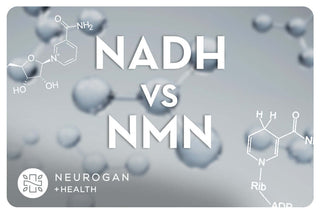NADH is the coenzyme form used directly in energy production, while NMN is a precursor that the body turns into NAD/NADH to support our cellular health.
NADH stands for nicotinamide adenine dinucleotide in its reduced form. The "H" in NADH represents a hydride ion (H) — a hydrogen ion with an extra electron. When NAD+ gains two electrons and one proton (a hydride), it becomes NADH.
To simplify, you can think of NADH and NAD as two sides of the same coin. NAD and NADH constantly cycle between each other in the cells. When you read about NAD, it often refers to this entire system, which includes both NADH and NAD. NMN, on the other hand, needs to be converted by the body to help restore NAD+ levels.
NADH vs. NMN Comparison Table
NADH and NMN support your body's NAD+ pools, but they do it in very different ways. Here's a breakdown to help you understand how each one works:
|
Feature |
NMN |
NADH |
|
What is it? |
A precursor compound to NAD+ |
The active, reduced form of NAD+ |
|
Function in the body |
Helps support NAD+ levels, which the body uses for cell function and maintaining healthy aging |
Carries electrons directly in energy production (ATP generation) |
|
Mechanism |
Must be converted into NAD+ before it’s usable |
Already active—used immediately in the mitochondria |
|
What's it used for? |
Supporting long-term NAD+ balance and healthy aging |
Immediate energy support and mitochondrial function |
|
Supplement format |
Commonly found in capsules and powders |
Available in capsules or sublingual tablets for fast absorption |
|
Shelf stability |
Generally stable in dry form |
Can be less stable and sensitive to light and heat |
|
Research focus |
Aging, metabolism, and NAD+ biosynthesis |
Cognitive health, fatigue, mitochondrial health |
Which One Should You Take?
Most people opt for NMN or other NAD+ precursors, such as NR, because they’re well-studied, absorb efficiently, and the body is adept at converting them into usable NAD+.
On the other hand, there’s some controversy around NAD and NADH supplements, mainly around whether the molecules are too large to absorb effectively when taken orally.
However, newer delivery methods, such as liposomal NAD/NADH, may enhance this absorption and provide a more direct pathway for the body to utilize the active compound. For that reason, some people use both: NMN to support long-term NAD+ levels and NADH for more immediate support with the body's energy conversion system.
NMN vs NADH Supplement Comparison
NMN supplements are typically used for long-term support of NAD levels and healthy aging, while NADH supplements are favored for their quick impact on cellular energy and mental clarity. Depending on your needs, you may choose one or the other.
|
Feature |
NMN Supplements |
NADH Supplements |
|
Common Dosage |
250–1000 mg per day |
10–20 mg per day |
|
Onset of Effects |
Gradual; supports NAD+ levels over time |
Fast-acting and may provide quicker energy support without jitters |
|
Format Options |
Capsules, tablets, powders, droppers |
Tablets and droppers |
|
Stacking Potential |
Often stacked with resveratrol, pterostilbene, or Urolithin A |
Can be stacked with NMN or CoQ10 for enhanced energy support |
|
Timing |
Daily, in the mornings, to coincide with natural energy levels |
Also can be used daily, but some people can take it as needed for fast-acting energy support and brain health |
NADH vs NMN vs NAD
NMN is a precursor compound that the body converts into NAD+, which is then used to generate NADH, the active form that fuels energy production in cells — you can think of it as a chain.
NAD and NADH are essentially two sides of the same coin that cycle between each other to carry out cellular functions.
To keep it simple, you could look at NMN and other NAD+ precursor supplements as a steady and reliable way to support your NAD levels over time. For a more direct approach, NAD or NADH supplements can provide a boost when you need it for cognitive function or staying alert.
Some people might take a precursor like NMN and NAD/NADH supplements together, but it's not always necessary to do so.
What matters most is understanding your own goals: NADH and NMN are involved in the NAD cycle, and the right supplements depend on what your body needs most.





